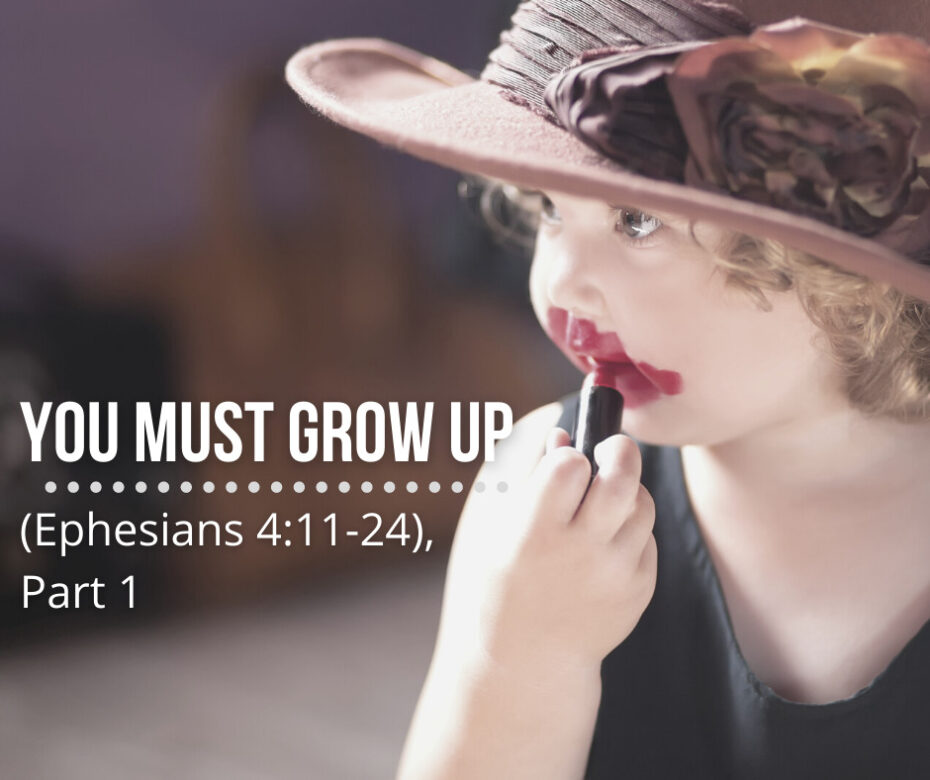Those of us who grew up in the ’80s and ’90s will remember one of the most famous jingles in retail history:
I don’t wanna grow up,
I’m a Toys R Us kid;
they got a million toys at Toys R us
that I can play with
We have idolized childhood, haven’t we?
How often do we tell kids, “These are the best years of your life!” (But are they?)
Growing up is hard to do, especially in a culture that reinforces hedonistic immaturity or that lacks a clear picture of what it means to be mature. We try very hard to appear “happy” or “successful,” but what does it mean to be mature?
Churches and individual Christians face the same problem—“I don’t wanna grow up!”
But you must grow up.
I mean that as a spiritual imperative, not as an inevitable outcome. You are not guaranteed to grow, which is why the Bible commands you to grow. If that spiritual growth was going to happen no matter what, then the command wouldn’t be necessary.
Paul emphasized the importance of growing up spiritually. And he put it squarely in the context of the local church.
And He gave some as apostles, some as prophets, some as evangelists, some as pastors and teachers, for the equipping of the saints for the work of ministry, for the building up of the body of Christ (Eph 4:11-12).
Why did Jesus give some people those prominent gifts? Was it so that they could do all the ministry in the church? That’s the typical expectation. In fact, it is normal to call pastors “The Minister.” That puts the burden of doing all the ministry on a handful of people. But is that what Paul told the Ephesians?
On the contrary!
The reason those roles were given was for “the equipping of the saints for the work of ministry” (Eph 4:11-12). Who, according to Paul, is supposed to do the ministry? Is it only the apostles and prophets and pastor-teachers?
No.
The saints do the ministry.
That means you.
In other words, Paul does not envision a passive laity and an active clergy. Instead, ministry should be fully participational. That is a fancy way of saying that all believers have ministry to do—no exceptions.
So instead of having a dichotomy between clergy and laity, would it be more Biblical to have a dichotomy between equippers/ministers? Imagine the difference that would make in church culture. Wouldn’t that change your self-perception and understanding of what should be happening? (Not that these were meant to be titles in the first place.)
In any case, Paul’s emphasis on equipping the saints to do ministry has an important goal:
As a result, we are no longer to be children, tossed here and there by waves and carried about by every wind of doctrine, by the trickery of people, by craftiness in deceitful scheming; but speaking the truth in love, we are to grow up in all aspects into Him who is the head, that is, Christ, from whom the whole body, being fitted and held together by what every joint supplies, according to the proper working of each individual part, causes the growth of the body for the building up of itself in love (Eph 4:14-16 NASB).
Don’t be a child—grow up!
Just as it is possible for you to remain a jobless thirty-year-old still playing video games in your parents’ basement in the same way you did when you were a kid, so, too, it is possible for you to remain a spiritual child who has failed to grow up “to a mature man, to the measure of the stature which belongs to the fullness of Christ,” (v 13) and so fail to do the ministry that God has gifted you to do.
Paul used the imagery of organs in a body. Have you ever heard of hypoplasia? It’s when an organ has failed to develop and mature along with the rest of the body. And when that happens, it affects the health of the body. Likewise, you can be an undeveloped, immature, organ in the local church. And that unhealthy immaturity affects the proper functioning of the rest of the body.
You must grow, not just for your own good, but for the good of your fellow Christians. They need you to be functioning properly so they can function properly, too.
The question is how does that growth happen?
In the next blog, I’ll explore what Paul told the Ephesians.


